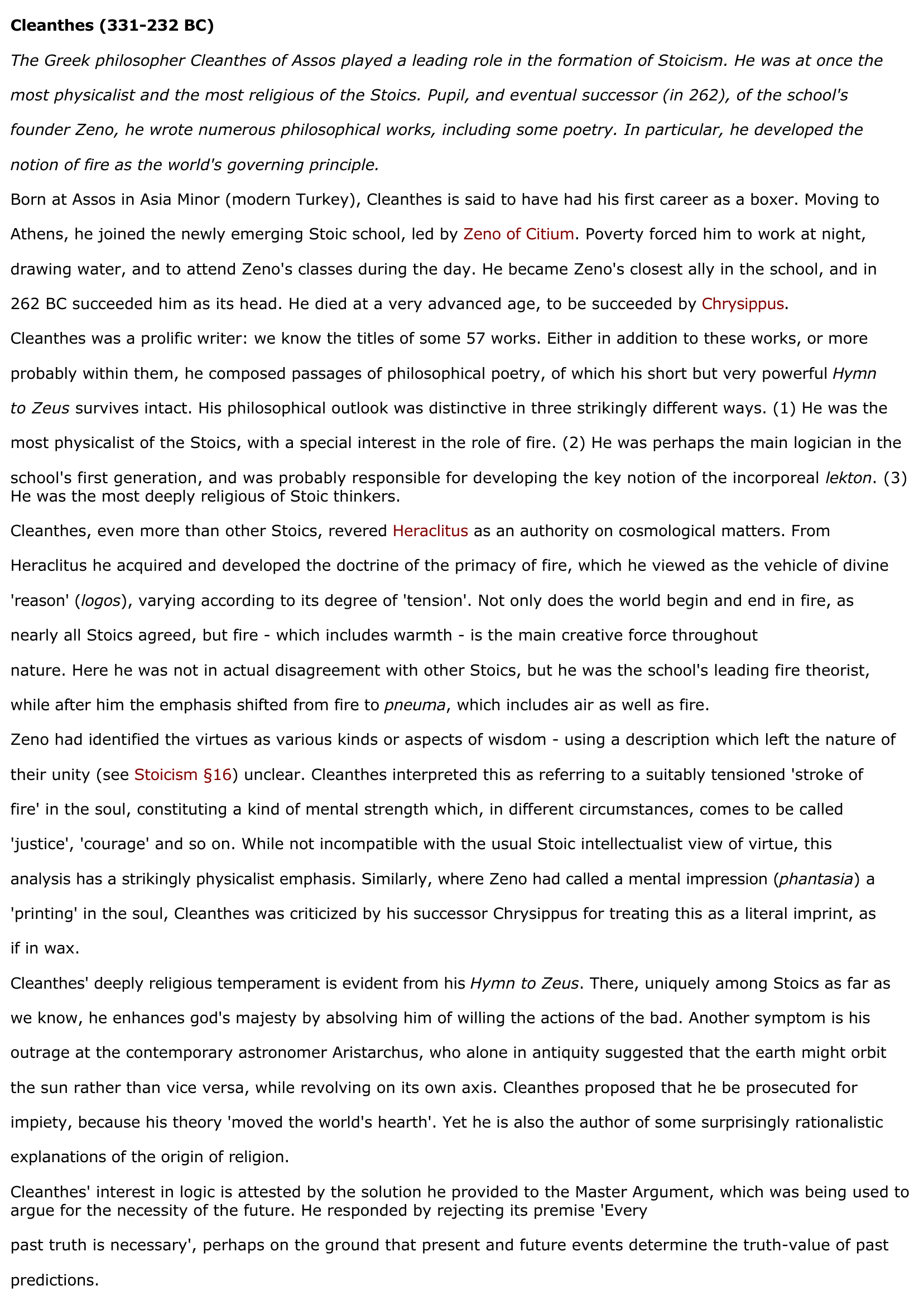Cleanthes
Publié le 16/05/2020

Extrait du document
«
Cleanthes (331-232 BC)
The Greek philosopher Cleanthes of Assos played a leading role in the formation of Stoicism.
He was at once the
most physicalist and the most religious of the Stoics.
Pupil, and eventual successor (in 262), of the school's
founder Zeno, he wrote numerous philosophical works, including some poetry.
In particular, he developed the
notion of fire as the world's governing principle.
Born at Assos in Asia Minor (modern Turkey), Cleanthes is said to have had his first career as a boxer.
Moving to
Athens, he joined the newly emerging Stoic school, led by Zeno of Citium .
Poverty forced him to work at night,
drawing water, and to attend Zeno's classes during the day.
He became Zeno's closest ally in the school, and in
262 BC succeeded him as its head.
He died at a very advanced age, to be succeeded by Chrysippus .
Cleanthes was a prolific writer: we know the titles of some 57 works.
Either in addition to these works, or more
probably within them, he composed passages of philosophical poetry, of which his short but very powerful Hymn
to Zeus survives intact.
His philosophical outlook was distinctive in three strikingly different ways.
(1) He was the
most physicalist of the Stoics, with a special interest in the role of fire.
(2) He was perhaps the main logician in the
school's first generation, and was probably responsible for developing the key notion of the incorporeal lekton .
(3) He was the most deeply religious of Stoic thinkers.
Cleanthes, even more than other Stoics, revered Heraclitus as an authority on cosmological matters.
From
Heraclitus he acquired and developed the doctrine of the primacy of fire, which he viewed as the vehicle of divine
'reason' ( logos ), varying according to its degree of 'tension'.
Not only does the world begin and end in fire, as
nearly all Stoics agreed, but fire - which includes warmth - is the main creative force throughout
nature.
Here he was not in actual disagreement with other Stoics, but he was the school's leading fire theorist,
while after him the emphasis shifted from fire to pneuma , which includes air as well as fire.
Zeno had identified the virtues as various kinds or aspects of wisdom - using a description which left the nature of
their unity (see Stoicism §16 ) unclear.
Cleanthes interpreted this as referring to a suitably tensioned 'stroke of
fire' in the soul, constituting a kind of mental strength which, in different circumstances, comes to be called
'justice', 'courage' and so on.
While not incompatible with the usual Stoic intellectualist view of virtue, this
analysis has a strikingly physicalist emphasis.
Similarly, where Zeno had called a mental impression ( phantasia ) a
'printing' in the soul, Cleanthes was criticized by his successor Chrysippus for treating this as a literal imprint, as
if in wax.
Cleanthes' deeply religious temperament is evident from his Hymn to Zeus .
There, uniquely among Stoics as far as
we know, he enhances god's majesty by absolving him of willing the actions of the bad.
Another symptom is his
outrage at the contemporary astronomer Aristarchus, who alone in antiquity suggested that the earth might orbit
the sun rather than vice versa, while revolving on its own axis.
Cleanthes proposed that he be prosecuted for
impiety, because his theory 'moved the world's hearth'.
Yet he is also the author of some surprisingly rationalistic
explanations of the origin of religion.
Cleanthes' interest in logic is attested by the solution he provided to the Master Argument, which was being used toargue for the necessity of the future.
He responded by rejecting its premise 'Every
past truth is necessary', perhaps on the ground that present and future events determine the truth-value of past
predictions..
»
↓↓↓ APERÇU DU DOCUMENT ↓↓↓


